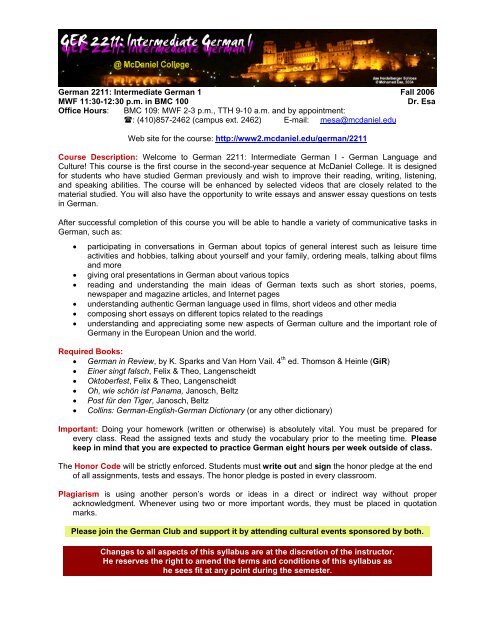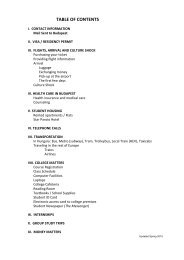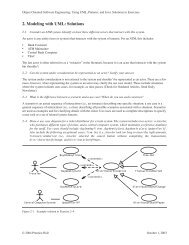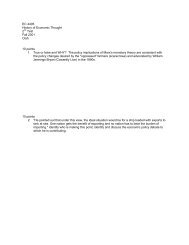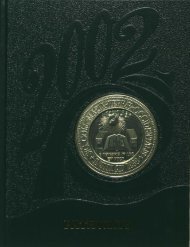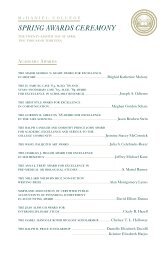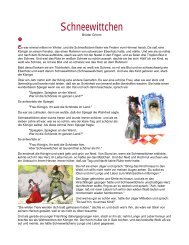German 2211: Intermediate German 1 Fall 2006 ... - McDaniel College
German 2211: Intermediate German 1 Fall 2006 ... - McDaniel College
German 2211: Intermediate German 1 Fall 2006 ... - McDaniel College
Create successful ePaper yourself
Turn your PDF publications into a flip-book with our unique Google optimized e-Paper software.
<strong>German</strong> <strong>2211</strong>: <strong>Intermediate</strong> <strong>German</strong> 1 <strong>Fall</strong> <strong>2006</strong><br />
MWF 11:30-12:30 p.m. in BMC 100<br />
Dr. Esa<br />
Office Hours: BMC 109: MWF 2-3 p.m., TTH 9-10 a.m. and by appointment:<br />
: (410)857-2462 (campus ext. 2462) E-mail: mesa@mcdaniel.edu<br />
Web site for the course: http://www2.mcdaniel.edu/german/<strong>2211</strong><br />
Course Description: Welcome to <strong>German</strong> <strong>2211</strong>: <strong>Intermediate</strong> <strong>German</strong> I - <strong>German</strong> Language and<br />
Culture! This course is the first course in the second-year sequence at <strong>McDaniel</strong> <strong>College</strong>. It is designed<br />
for students who have studied <strong>German</strong> previously and wish to improve their reading, writing, listening,<br />
and speaking abilities. The course will be enhanced by selected videos that are closely related to the<br />
material studied. You will also have the opportunity to write essays and answer essay questions on tests<br />
in <strong>German</strong>.<br />
After successful completion of this course you will be able to handle a variety of communicative tasks in<br />
<strong>German</strong>, such as:<br />
• participating in conversations in <strong>German</strong> about topics of general interest such as leisure time<br />
activities and hobbies, talking about yourself and your family, ordering meals, talking about films<br />
and more<br />
• giving oral presentations in <strong>German</strong> about various topics<br />
• reading and understanding the main ideas of <strong>German</strong> texts such as short stories, poems,<br />
newspaper and magazine articles, and Internet pages<br />
• understanding authentic <strong>German</strong> language used in films, short videos and other media<br />
• composing short essays on different topics related to the readings<br />
• understanding and appreciating some new aspects of <strong>German</strong> culture and the important role of<br />
<strong>German</strong>y in the European Union and the world.<br />
Required Books:<br />
• <strong>German</strong> in Review, by K. Sparks and Van Horn Vail. 4 th ed. Thomson & Heinle (GiR)<br />
• Einer singt falsch, Felix & Theo, Langenscheidt<br />
• Oktoberfest, Felix & Theo, Langenscheidt<br />
• Oh, wie schön ist Panama, Janosch, Beltz<br />
• Post für den Tiger, Janosch, Beltz<br />
• Collins: <strong>German</strong>-English-<strong>German</strong> Dictionary (or any other dictionary)<br />
Important: Doing your homework (written or otherwise) is absolutely vital. You must be prepared for<br />
every class. Read the assigned texts and study the vocabulary prior to the meeting time. Please<br />
keep in mind that you are expected to practice <strong>German</strong> eight hours per week outside of class.<br />
The Honor Code will be strictly enforced. Students must write out and sign the honor pledge at the end<br />
of all assignments, tests and essays. The honor pledge is posted in every classroom.<br />
Plagiarism is using another person’s words or ideas in a direct or indirect way without proper<br />
acknowledgment. Whenever using two or more important words, they must be placed in quotation<br />
marks.<br />
Please join the <strong>German</strong> Club and support it by attending cultural events sponsored by both.<br />
Changes to all aspects of this syllabus are at the discretion of the instructor.<br />
He reserves the right to amend the terms and conditions of this syllabus as<br />
he sees fit at any point during the semester.
<strong>German</strong> <strong>2211</strong> 2<br />
Special need: If you have any special needs, please share them with your instructor so that he/she may<br />
accommodate them as directed by Student Academic Services. Please give your instructor the<br />
written notice from that office outlining these accommodations by the end of the first week of classes.<br />
Thank you!<br />
Classroom Deportment: In order to have an optimal teaching and learning environment, please keep<br />
the following guidelines in mind: arrive promptly and dressed properly for the classroom (no caps, no<br />
pajamas); treat everyone in the class with courtesy; turn off your cell phones before class; give the<br />
instructor your complete attention.<br />
Tutoring is available. Hours and name of the tutor will be announced in class.<br />
Grading:<br />
Preparation, Participation & Konversationsstunde 20%<br />
Quizzes 20%<br />
Group Presentations 20%<br />
Portfolio 20%<br />
Final Exam 20%<br />
TOTAL 100%<br />
Grading Scale:<br />
A+ 97 – 100% C+ 77 – 79%<br />
A 93 – 96% C 73 – 76%<br />
A- 90 – 92% C- 70 – 72%<br />
B+ 87 – 89% D+ 67 – 69%<br />
B 83 – 86% D 63 – 66%<br />
B- 80 – 82% D- 60 – 62%<br />
Requirements<br />
Students are required to attend all classes, a couple of evening lectures and concerts recommended by<br />
the instructor, see all films, and participate in classroom discussions and in other group activities. All<br />
readings listed on the syllabus are required, and should be completed by the day for which they are assigned.<br />
Attendance is mandatory. Three (3) unexcused absences will lower the final grade by 3%, four (4) by 6%<br />
and so on. Excused absences are at the discretion of the instructor. Absences caused by college<br />
related activities or religious holidays are only excused if the instructor is made aware of them in<br />
advance. Please provide a written excuse for each class hour missed.<br />
Daily Preparation & Class participation: Daily preparation and active participation in class are very<br />
crucial for improving your language skills. Please read all required pages for each class hour, study<br />
the vocabulary, and prepare the exercises assigned. Be active in class. Speak up, speak out, throw<br />
your hat into the ring! “Use it or lose it!”<br />
Regular attendance is an obvious requirement to get a good participation grade. Your participationgrade<br />
is based on the following evaluation:<br />
A shows total preparation; original comments and constant references to assigned materials;<br />
B noteworthy oral participation, with full understanding of the material/ participates voluntarily often;<br />
C participates once in a while/ participates by request only;<br />
D present, but no participation;<br />
F absent.<br />
Konversationsstunde. Anna-Lena Schenck, the <strong>German</strong> Assistant from Berlin, will set up a time for a<br />
weekly conversation hour with the entire class. The conversations will be conducted entirely in<br />
<strong>German</strong>. Anna-Lena will have a sign up sheet for each week. Each time you miss or don’t participate<br />
in the Konversationsstunde, you will lose 1% of the final grade.<br />
Quizzes: You will have 4 quizzes based on the grammar book and the four books we will read. Missed<br />
quizzes may not be made up, and will be recorded as zeros unless a valid excuse is presented to the<br />
instructor.
<strong>German</strong> <strong>2211</strong> 3<br />
Group Presentation: The students will be divided up into small groups and are expected to work<br />
together on two oral presentations: The first group presentation is about the film Lola rennt and it is<br />
scheduled for October 18 th and 20 th . You’ll receive further information later on in the semester. The<br />
second group presentation will be about a creative idea. Write your own play and perform it. Make a<br />
<strong>German</strong> music video using various pictures from the Internet and the audio track. Make a film from<br />
one of the books you have read (I’ll give you more details on this). Study simple dialogues or<br />
sketches and perform them with others. Play a scene from your daily life, etc. The second group<br />
presentation is scheduled for December 4 th and 6 th .<br />
Portfolio: A portfolio is a collection of your own work. It includes materials connected with the class.<br />
Portfolios include samples of evidence that demonstrate the progress of your language learning. You<br />
can either use a 1” ring binder with at least 4 tab dividers, or submit everything digitally on a CD, via<br />
Blackboard or put it on the server in the Foreign Language Lab. I’ll show you how this works. I will<br />
collect the portfolio twice in the semester. Each time I collect the portfolio, I’ll read it, make some<br />
comments and give you 100 points. If you don’t submit the portfolio you don’t receive any points.<br />
However, I do give extra points for creative and comprehensive portfolios.<br />
Your portfolio will consist of 4 parts: homework assignments, vocabulary lists, speaking samples and<br />
oral interviews that must be submitted either on a CD or posted on the server in the foreign language<br />
lab, and finally a reflection part.<br />
• Homework Assignments/ Essays: Homework will include assigned exercises in the<br />
grammar book as well as additional essays on the books we will read. Essays (at least 250<br />
words each) will be graded on quality of the content, use of vocabulary, grammatical<br />
accuracy, and comprehensibility. You will write the essays twice. I will read your first drafts<br />
and return them back to you with suggestions and comments. Your corrections should<br />
incorporate my suggestions. The final grade for the essays is the average of both drafts. If<br />
you miss the first deadline for the essays, you’ll lose the chance to rewrite them.<br />
• Weekly Vocabulary lists: This is your own Wörterbuch (dictionary). To accomplish this<br />
successfully, you must take notes in class on a daily basis. I would use a good composition<br />
book just for this purpose and then type up the vocabulary on a weekly basis. Record words,<br />
phrases, idiomatic expressions, and grammar points that are of interest and importance to<br />
you. This is not limited only to items covered in class. You can also include items you<br />
encounter outside of class. You may want to collect <strong>German</strong> words and phrases about one or<br />
two areas you like to speak and write about: your favorite <strong>German</strong> (US) musician, painter,<br />
writer, or about your favorite sport, about your hobbies, leisure time activities, about politics,<br />
etc. I would recommend starting with words and phrases and then move to whole sentences<br />
and then paragraphs. By the end of the semester, you’ll be comfortable writing short essays<br />
about these topics.<br />
• Speaking samples: You’ll record yourself four times in the semester using the foreign<br />
language lab:<br />
1. At the beginning of the semester you’ll tell the instructor something about yourself (your<br />
name, age, major, hobbies, etc.); due September 18 th .<br />
2. In the second part, you will talk record what you have done in an entire week and then<br />
talk about that in the past tense or present perfect, due October 13 th .<br />
3. In the third part, together with a partner, perform excerpts from one of the books we read<br />
in class; due November 6 th .<br />
4. At the end of the semester, you will talk about what you have done during the entire<br />
semester. Tell us about what you have learned, what courses you had, and which you<br />
liked the most and why. Talk about any field trips you have taken or films you have seen,
<strong>German</strong> <strong>2211</strong> 4<br />
etc. Be creative and use your imagination. Don’t read from a text you have already<br />
written. Try to speak freely just using talking points. Due December 1 st .<br />
You may save these samples directly onto your folder in the Foreign Language Lab or send<br />
them to me via e-mail. speaking samples 1 and 3 must be sent to me when they are due,<br />
2 and 4 must be submitted (along with 1 and 3) when the portfolio is due. However, I<br />
would suggest that you don’t wait until the last minute. Try to record yourself more than one<br />
time before you decide to submit the recording. You will not be able to erase your recording<br />
once you have saved it onto the server.<br />
• Reflections: In this section you’ll reflect about the learning process itself, about what and<br />
how you learned, and also about the <strong>German</strong> language and culture. Include short comments<br />
in <strong>German</strong> and deeper, reflective pieces in English. There are no limits of how much you can<br />
write here. I would suggest that you record your reflections every week and then write up a<br />
summary before the fall break and at the end of semester when the portfolio is due.<br />
Final Exam: The final exam will cover all the materials studied in the <strong>Fall</strong> semester. Keep and correct all<br />
of your quizzes. They will be very helpful as a review for the final exam.<br />
Extra Credit: There are many ways to earn extra credit. You can attend cultural events recommended by<br />
instructor, write up summaries in <strong>German</strong>, and include these in your portfolio, clearly marked as extra<br />
credit with title of event, place and date of event, and by whom it was sponsored . You can help with<br />
<strong>German</strong>-American Day on October 17 th and earn either some money or extra credit. You can also<br />
conduct and oral interview or exam with the instructor. The oral interviews will take place in the last<br />
two weeks of classes and questions will be asked about the books we have read in the semester.<br />
Viel Spaß und Erfolg!


